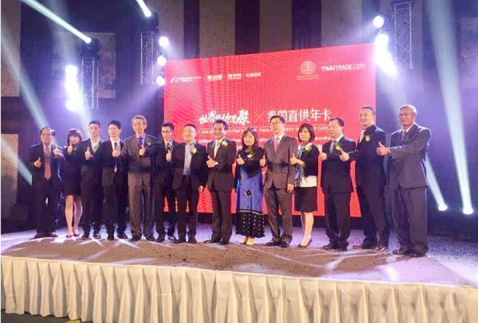Alibaba and Thailand's Ministry of Commerce to launch cross-border direct annual card
 Nittaya China CEO Lin Qijiang (6th from left), Juhuasuan Marketing Director Liu Bo (7th from left), Thai Deputy Deputy Minister of Commerce Wu Thichai (middle), Chinese Embassy in Thailand Economic and commercial Counselor Zhang Peidong (6th from right) at the press conference.
Nittaya China CEO Lin Qijiang (6th from left), Juhuasuan Marketing Director Liu Bo (7th from left), Thai Deputy Deputy Minister of Commerce Wu Thichai (middle), Chinese Embassy in Thailand Economic and commercial Counselor Zhang Peidong (6th from right) at the press conference.
On September 22, China's largest e-commerce platform Alibaba and the Ministry of Commerce of Thailand held a strategic cooperation summit in Bangkok, announcing that they will jointly launch the "Thailand Direct Annual Card", which is the first cross-border direct annual card issued by Alibaba in the world.
"Starting from September 23, consumers can purchase Thailand Direct Annual Pass through Alibaba's Juhuasuan platform," said Liu Bo, marketing director of Alibaba's Juhuasuan. Consumers will enjoy fresh Thai fragrant rice, seasonal Thai fruits, natural latex bed products, Thai New Year gift packages, Thailand holiday travel ticket packages and other products within 12 months of the year, and the annual card package price will be more discounted than the daily price of goods.
Liu Bo said that Thai food, fragrant rice and other specialty products have long been known and loved by Chinese consumers. In 2013 and 2014, Juhuasuan platform launched two periods of "Gathering Thailand" activities. The first phase of the activity sold 100 tons of Thai fragrant rice, the second phase of the activity sold a total of 40,000 Thai latex pillows, and the turnover of latex products reached 7 million yuan.
"Thailand's latex products have expanded their visibility in the Chinese consumer market through the 'Gathering Thailand' activity, and also let Thai brand manufacturers see the huge energy of Ali's e-commerce platform, and the idea of Thailand's direct annual card is just like this," Liu Bo said.
Thai Deputy Deputy Minister of Commerce Wu Thitchai said that with the deepening of economic and trade exchanges between China and Thailand, Chinese consumers are now increasingly accepting Thai culture and characteristic products, "Thai merchants have begun to try to send high-quality goods in agriculture, latex industry and other fields directly to China through Alibaba platform, and reached a good turnover." Led to the development of related industries. This is also why Thailand wants to further deepen cooperation with China through e-commerce platforms."
On the same day, a total of more than 20 high-quality Thai suppliers participated in the cooperation summit. Zhang Peidong, economic and commercial counselor of the Chinese Embassy in Thailand, and the guests carefully understood the products of various suppliers. Zhang Peidong said that this year marks the 40th anniversary of the establishment of diplomatic ties between China and Thailand, and the two countries have held a number of celebration activities, pushing the friendship of "China and Thailand as one family" to a new height. Despite the overall decline in the international market this year, China-Thailand economic and trade cooperation has risen against the trend, reflecting huge room for growth. According to Chinese statistics, from January to July this year, bilateral trade reached 41.87 billion US dollars, up 5.5% year-on-year, and China's new investment in Thailand reached 280 million US dollars, up 112% year-on-year. At the recently held 12th China-Asean Expo, Thailand, as the theme country, has also received high attention and praise from Chinese enterprises.
Zhang Peidong said that in the past 10 years, China's e-commerce has developed rapidly, and online shopping has become one of the main consumption ways for Chinese consumers, especially rice, Thai and latex pillows from Thailand are very popular with Chinese consumers. According to statistics, in the first half of 2015, China's online retail sales of consumer goods was about 258 billion US dollars, an increase of 39%, accounting for 10% of the total retail sales of consumer goods in the whole society, that is to say, every 10 US dollars of goods purchased by Chinese consumers, 1 US dollar is purchased online, and this proportion is still expanding.
Zhang Peidong said that the Chinese Embassy in Thailand will fully support the cross-border e-commerce cooperation between the two countries, and hopes that Thai enterprises will seize the opportunity of the rapid development of China's online shopping market to provide more Thai quality products for Chinese consumers, and hope that Juhuasuan platform will provide better services for Thai enterprises in terms of sales channels and brand building, so as to achieve mutual benefit and win-win results.
It is understood that after the launch of the "Thailand Direct Annual Card", Alibaba will also work with relevant government departments in various countries around the world to create an integrated industrial consumption card with national characteristics to provide consumers with special direct goods from around the world.













Please first Loginlater ~